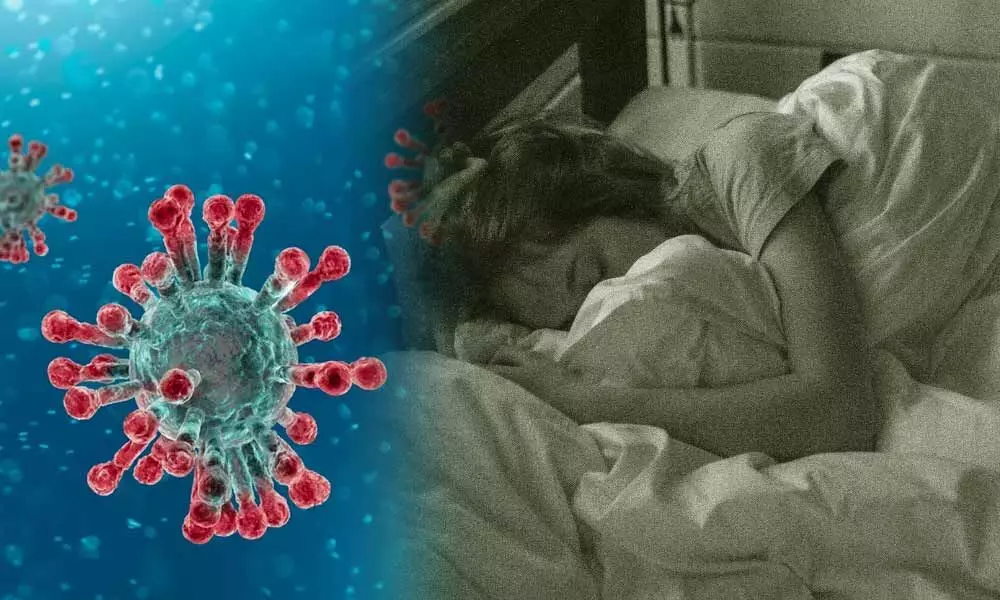Losing sleep over the coronavirus pandemic, here are the tips to Sleep Better
 Losing sleep over the coronavirus pandemic, here are the tips to Sleep Better
Losing sleep over the coronavirus pandemic, here are the tips to Sleep BetterBy Dr.PallaviAravind Joshi, Consultant Psychiatrist, Columbia Asia Hospital Whitefield.
The novel coronavirus has brought the world to a haltand people are stressed out and there is a sense of uneasiness.Keeping up with work-from-home obligations to managing a house full of children who are accustomed to being at school can pose real problems leading to stress and discord. As economic activity stalls and job losses mount, it's normal to worry about income, savings, and making ends meet. People have been managing reductions in income and facing other stresses related to isolation, anxiety about illness, and disruptions to their routines.
There is still a lot unknown about this pandemic like how much the disease will spread, when the economy can recover and such uncertainty often brings anxiety that disrupts sleep as a racing mind keeps the body tossing and turning. The stress from thinking about all this reflects in our quality of sleep and can lead to insomnia even in people who do not usually suffer from it.
Sound sleep is very crucial to physical health and effective functioning of the immune system. It is also a key promoter of emotional wellness and mental health, helping to beat back stress, depression, and anxiety. Taking steps to ensure adequate sleep is important.
With this in mind, here are tips for better sleep, even when life feels uncertain.
Establish a regular schedule
Adhere to your regular bedtime and wake-up times as it will help you maintain a healthy sleep routine.The more you maintain your schedule, the easier it will be to manage your anxiety and get adequate sleep.
Limit watching News
Constantly checking for news updates and reading about the pandemic is likely to only increase anxiety.Nonstop news watching and reading can also increase your feelings of helplessness and being out of control, which can spiral into sleeping problems. Therefore, to limit your anxiety and support better sleep, set some ground rules for watching the news.
Maintain Healthy diet
Although you may be under astay at home order, that doesn't mean you can sit on the couch and snack junk food. Avoid too much consumption of coffee as it can cause delay in sleep. Eating large, diet rich meals before going to bed can also delay sleep. It is recommended to control the quantity of the consumption of food because anything in excess may harm sleep.
Maintain daily physical activity
Staying active during social distancing helps build enough body fatigue to fall asleep more easily and get a deeper sleep.Yoga, meditation and physical activities supports mental well-being and sleep cycle.
Avoid digital gadgets
New technologies are an integral part of our lives and we are all addicted to our smartphones, tablets and laptops. It is important to keep aside gadgets at least 30 minutes before your scheduled sleep time.
Avoid alcohol to fall asleep
This is a self-medication strategy that might seem like a good idea but may instead have negative long-term consequences such as sleep fragmentation, early morning awakenings, and daytime impairments. So, avoid consumption of alcohol to fall sleep.
Relax properly
Relaxation doesn't lead to sleep unless you are doing the above steps to regulate sleep and build up sleepiness at the right times. Certain activities may help you relax, such as listening to a relaxing music, and trying meditation or breathing exercises.When you are increasingly anxious focus on reducing the anxiety. Remind your brain you are safe.
Other than these before hitting the bed one can follow these simple suggestions –
• Bed should be used only for sleeping, not for chatting, watching videos, eating. Why? Just by using it for sleeping you condition your mind, so whenever you go there you feel sleepy.
• Tell yourself that sleep is heavily a work of unconscious mind. Affirm everyday- I sleep like a baby or I am relaxed and calm when I sleep. Say this again and again and it works wonders.
• By consuming high tryptophansnack before 30mins of bed will enhance one's sleep like milk is very rich in tryptophan.
• Warm shower 2 hours prior to bed often helps.
• If you are not getting sleep inspite of lying down in the bed for 30 minutes don't toss in bed please go in other room and start doing some activity quietly till u feel again sleepy.
• Lastly if sleep issues persist for more than 2 weeks in the form of difficulty in initiating and maintaining sleep or feeling sleepy whole day or lack of energy after getting up, please consult a Psychiatrist there are excellent remedies available for the same."
If your anxiety feels overwhelming, talk to your doctor or a mental health provider. What you are feeling is valid and you aren't alone. Talking to a professional or even a trusted friend can help you gain some perspective and learn new coping skills. If you are having significant trouble sleeping, your healthcare provider may be able to prescribe some medication or recommend some exercises and supplements to support your sleep during this time.
The world is full of uncertainty right now, so it only makes sense if you are having trouble sleeping.Taking steps to manage your anxiety and stay as healthy as possible could help you get through this challenging time and move forward when the pandemic subsides.















